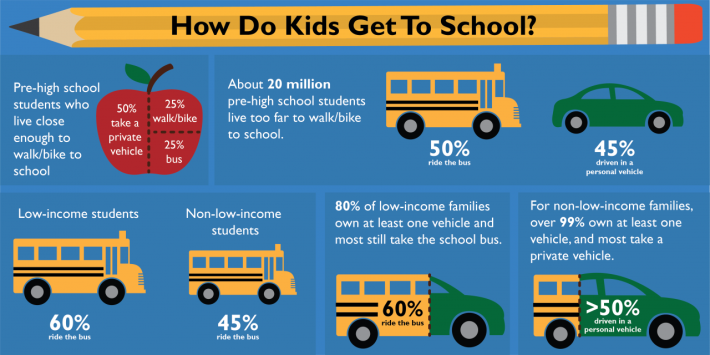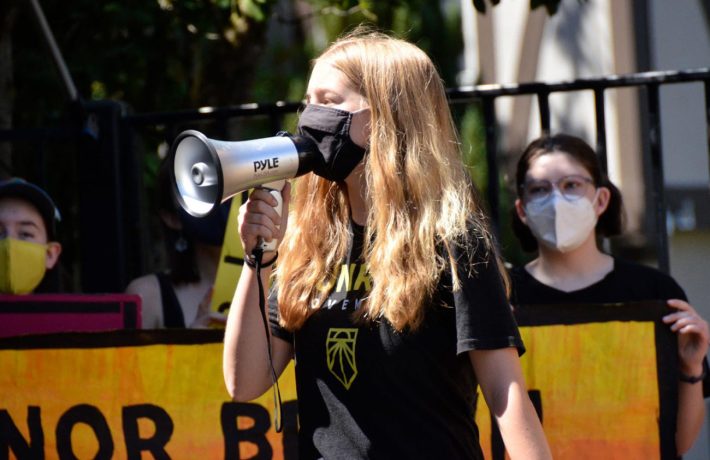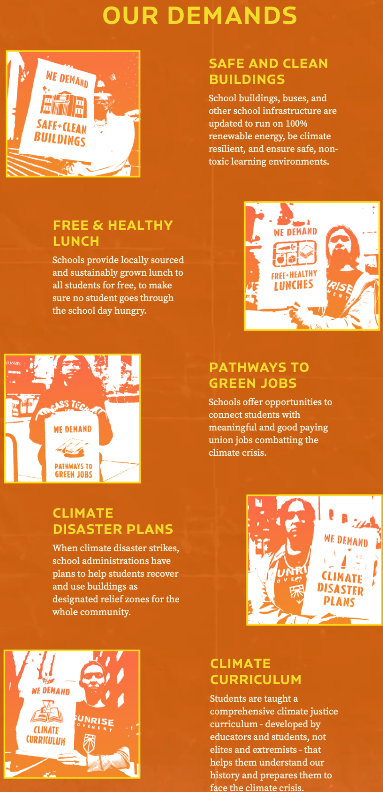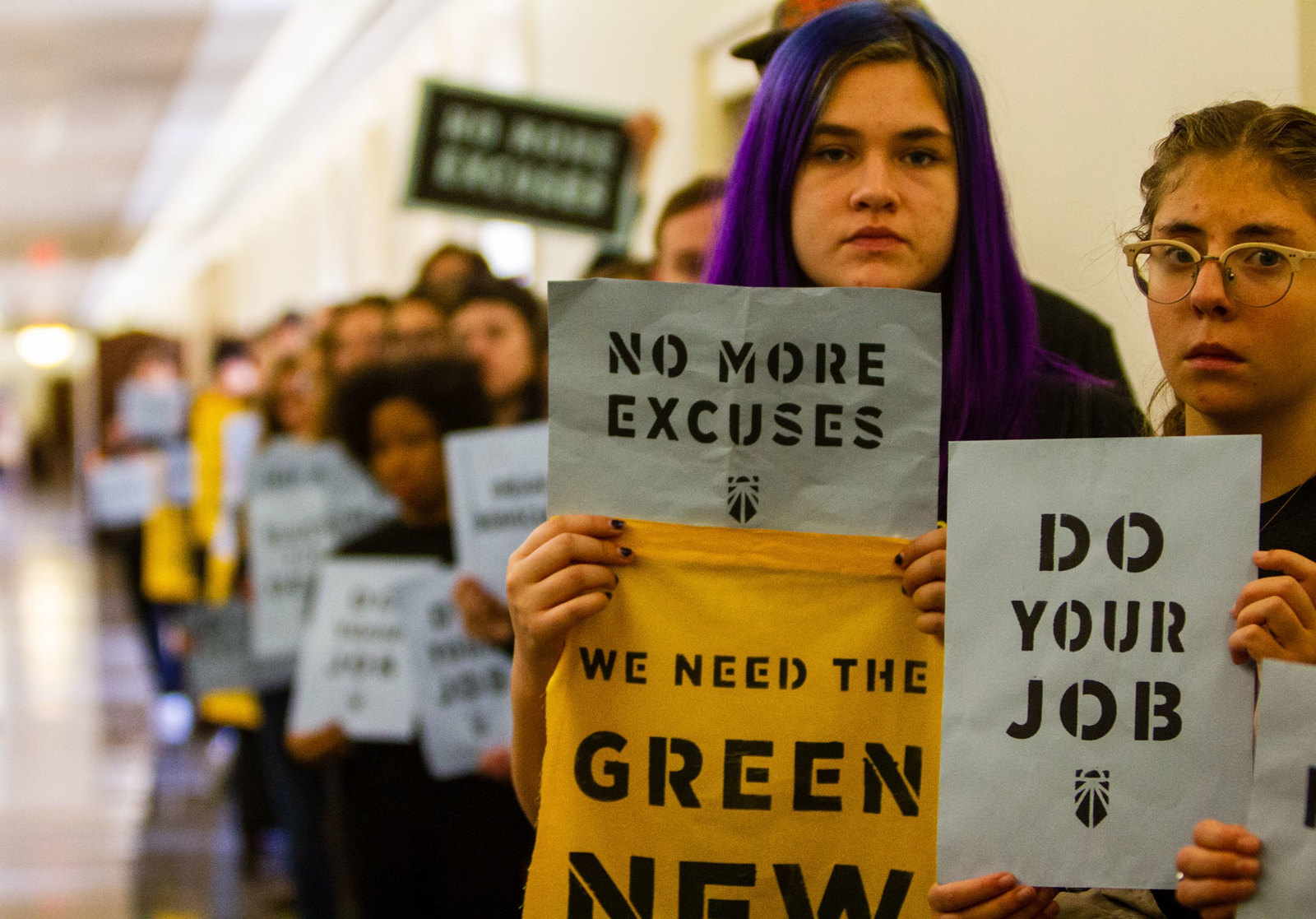Youth activists are demanding that U.S. schools take meaningful action to confront the climate crisis — including a radical reimagining of how students arrive at their doors, and what they learn about the emissions impacts of our transportation policies once they're inside the classroom.
Last week, the Sunrise Movement launched its Green New Deal for Schools campaign, which 17-year-old organizer Adah Crandall describes as a grassroots, youth-led effort to "transform public schools in America to face the climate crisis and ensure all students receive safe and high-quality education – no matter their ZIP code or the color of their skin."
That expansive bottom-up campaign — which has already recruited student leaders in more than 50 districts across America — was launched in tandem with the newly reintroduced Green New Deals for School Act, which would provide $1.6 trillion in top-down federal investments to fund the implementation of green policies. And if it passes, the organizers hope it could be foundational for passing even more expansive legislation.
"We know that schools are where a lot of people in our society get their initial understanding of how the world works," Crandall said. "And so we know that when we transform our schools to stop the climate crisis, we can pave the way for the rest of society to follow. It's part of a broader national vision for a Green New Deal."
Not all of the policies in the Green New Deal for Schools are aimed exclusively at transportation, but Crandall stressed that the need for sustainable mobility is interwoven into each of the Deal's five core demands.
In addition to demanding that schools are retrofitted for climate resilience, the group is also urging schools to electrify their buses, as well as ensure that students have a safe way to walk or bike to class without relying on fossil fuels. Crandall has also lobbied to give students training on how to confidently navigate mass transit.
"There should be fast and reliable buses that students can take to get to school, whether that's school buses or city buses that are funded by the government," added Crandall. "And students [need to be] able to take them for free, because no student should have to pay to get to the place where they're legally required to be every day."

Even that straightforward ask, though, has already proven challenging. Crandall recently took a gap year before college to work with the Sunrise Movement helping other youth leaders advocate for Green New Deal programs across the country, and she says it's often "difficult to get school districts to go to in the weeds about decarbonizing school transportation" because some "literally don't even believe in the climate crisis."
And that denial is spreading into the classroom. One 2016 study found that U.S. students get less than two hours of climate education in an entire academic year.
"I have a group that I'm working with in Georgia that isn't allowed to learn about the climate crisis at all, because it's considered a 'divisive topic,'" she adds. "Meanwhile, in other places, [students] have a little bit of climate education, maybe, in environmental science classes. But from what I've seen, there's really nowhere where students are being explicitly taught about the way that our transportation system is contributing to the climate crisis."
Crandall emphasized that even students in relatively progressive districts like the one she attended in Portland, Ore. need to be taught more about how car dependency specifically impacts the environment, and why we can't confront the climate emergency unless we dismantle it.
"The closest thing we have [to good transportation-related climate education] are curricula that teach exactly what the fossil fuel industry wants us to be taught: that we all have our individual carbon footprints," she added. "And that's just not a useful thing to focus on, because this crisis is not the fault of individual people making individual choices to drive their cars. It is the fault of a system that has prioritized cars over people, and over our planet. It's a system that has essentially given people no choice but to drive."

Under the Green New Deal for Schools, advocates are demanding that "students [be] taught a comprehensive climate justice curriculum — developed by educators, scientists, and students, not politicians and lobbyists — that helps them understand our history and prepares them to face the climate crisis."
And until everyone can get that education, Sunrise leaders are training a legion of advocates to demand it. The group recently gathered hundreds of high schoolers for "Sunrise Summer Camp" in rural Illinois, where they received intensive training on how to organize for Green New Deal policies in their towns — and not only in ways that policymakers find polite.

"We know our school districts probably aren't going to just pass these really expensive [changes] after a few students show up and give public comments," Crandall said. "So we are prepared to escalate. Students are ready to strike from school; we're ready to take over and disrupt school board meetings; we're ready to run for school boards ourselves. ... Our generation knows that this is the fight of our lives, and we have thousands of people who like will stop at nothing to win it."
At the same time, though, Crandall is deeply aware that children shouldn't have to be the ones leading the fight to save the planet — even if the adults in their lives aren't giving them much of a choice.
"People in power love to say, 'Oh, the youth will save us,'" Crandall adds. "But it's absolutely unreasonable for adults to expect young people to stop the climate crisis when we aren't even learning the basic facts about it in our schools."






